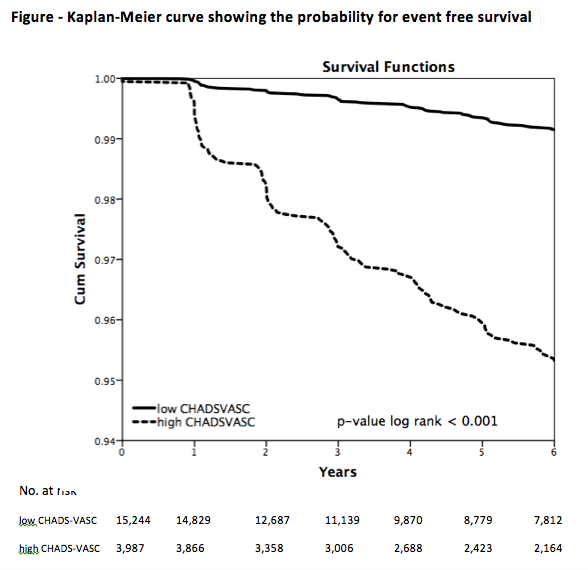
CHADS-VASC Score and the Risk of New Onset Atrial Fibrillation among Middle Age Adults
2Leviev Heart Center, the Chaim Sheba Medical Center, Tel Hashomer
3Institute for Medical Screening, the Chaim Sheba Medical Center, Tel Hashomer
4Department of Internal Medicine C, the Chaim Sheba Medical Center, Tel Hashomer
5Pinchas Borenstein Talpiot Medical Leadership Program, the Chaim Sheba Medical Center, Tel Hashomer
Background: CHA2DS2-VASc is a scoring system used for predicting stroke and thromboembolism risk in patients presenting with atrial fibrillation (AF). We hypothesized that the scoring system can be used to identify subjects at risk for new onset AF.
Methods: We investigated 19,233 asymptomatic self-referred men and women. All subjects were outpatients free of AF at baseline. The primary endpoint was new onset AF during follow-up. CHA2DS2-VASc was categorized as ≥1 vs. 0 Results: Mean age of study population was 49 ± 11 years and 73% were men. 15,244 (79%) subjects had CHA2DS2-VASc of 0. A total of 366 incident events occurred during an average follow-up of 6.7 years. Kaplan Meier survival analysis (Figure) showed that the cumulative probability of AF at 6 years was significantly higher among subjects with CHA2DS2-VASc >= 1 (6%) compared to those with CHA2DS2-VASc = 0 (1%), pConclusions: Our findings suggest that CHA2DS2-VASc can be used to predict new-onset AF among asymptomatic middle age adults.

Powered by Eventact EMS